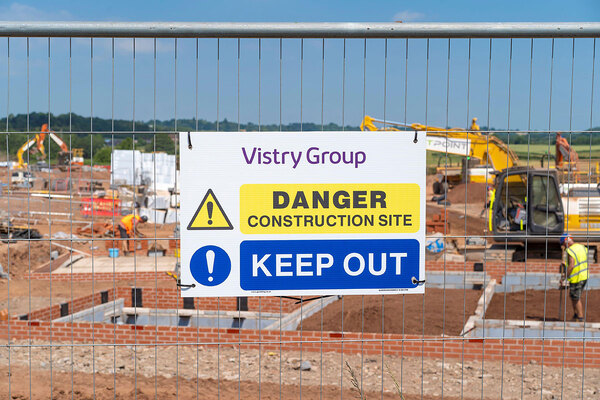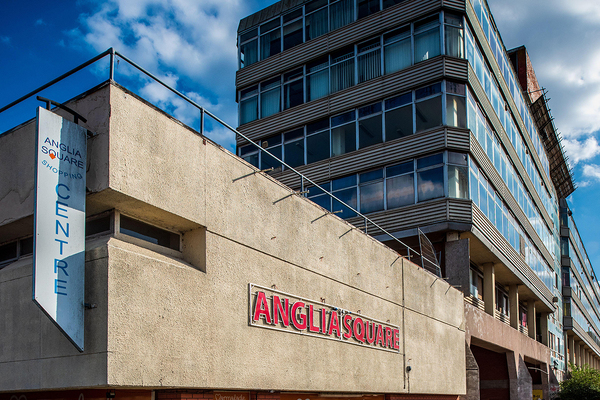You are viewing 1 of your 1 free articles
The election’s big housing day – blink and you’ll miss it
Inside Housing columnist Jules Birch analyses the media appearances on the general election “housing day”
The focus of the election finally turned to housing yesterday, but blink and you may have missed it.
The issue described as “the dog that hasn’t barked” by Nick Ferrari on his LBC radio programme was briefly across the airwaves. Housing secretary Michael Gove led for the Conservatives and shadow housing minister Matthew Pennycook represented Labour in the wake of plans for rental reform launched overnight.
However, an anonymous quote in Politico Playbook did cause some howling, with a Labour official supposedly saying, “I don’t care if we flatten the whole green belt, we just need more houses in this country”.
Prime minister Rishi Sunak took time off from preparing for the evening’s Question Time to tweet that it was “good to finally get Labour’s real views on Britain’s green belt”, while Labour leader Sir Keir Starmer flatly denied the whole thing on a visit to a housing development on the edge of York. “No, that wasn’t Labour party officials,” he said. “That wasn’t Labour party policy.”
So what did we learn from election housing day? I dipped into the morning media round in a bid to find out.
First, housing comes a poor third to the state of the opinion polls and the latest developments in the election campaign. On Breakfast on BBC One, Mr Gove spent most of his time fielding questions about gambling by Tory MPs and the government’s overall record, and was not even asked about housing.
Second, there is never enough time in the national media for anything more than a superficial look at the parties’ policies – just look at the way a crucial area like building safety was not even discussed. On the Today programme on Radio 4, the two politicians were interviewed one after the other.
Mr Gove dutifully deployed the key lines from the Conservative manifesto: the cut in stamp duty, the revival of Help to Buy and building more homes.
Asked if the government had failed, he admitted “we haven’t done as well as we should”, but he was not challenged on his own surrender to Tory backbenchers on planning.
Third, even though Mr Pennycook was not asked about the announcement on rental reform, Labour has a positive story to tell about its plans.
“There is never enough time in the national media for anything more than a superficial look at the parties’ policies – just look at the way a crucial area like building safety was not even discussed”
Asked to give two ways in which the party would get more homes built, he had no trouble nominating the reversal of Mr Gove’s change, such as the scrapping of mandatory targets and the revival of strategic planning plus the strategic release of ‘grey belt’ land within the green belt.
He was also pressed on New Towns and asked why Labour was not showing the same ambition as its post-war predecessor by backing them with public investment and loans from the Treasury.
“There is that ambition in our manifesto,” he said. “We’ve been very clear that we intend to initiate a whole series of large-scale new communities across the country. That might be urban regeneration projects, that might be urban extensions, but it will include New Towns. We’ve already had approaches from a number of local areas interested in what that might mean.”
Asked how many, he would not say. “We’ve not picked a number for a very simple reason: there will be a task force of independent experts to recommend sites.”
If that sounds like a recipe for delay, he also promised to learn lessons from the failure of Gordon Brown’s eco towns and a clear message emerged about the importance of a New Towns programme to Labour’s overall ambitions. “Without it, we cannot build at the scale we need it,” he said.
Fourth, when Labour is pressed about the details of its policies, some interesting hints about its thinking does emerge.
Mr Pennycook was probed about the Right to Buy. With two-thirds of homes ending up in the private rented sector, and Andy Burnham, the Labour mayor of Greater Manchester, arguing that building new council houses while Right to Buy remains in place was “like trying to fill a bath with the plug out”, why wouldn’t the party commit to abolishing it?
His answer was revealing, both about why the manifesto says what it does and about what Labour could do next, with a strong signal that it will act on that issue about new council homes.
“Andy is absolutely right,” he said. “As we drive to build more, we have to stop the outflow of existing stock. We haven’t said, ‘Let’s commit to abolishing Right to Buy outright’, for both political and practical reasons. A really simple practical reason is that it would require primary legislation that would take a lot of time.
“What we’ve said is we can review the discounts, unpick the very generous increases in discounts that were put in place in 2012 that have seen a huge outflow of council homes, often then bought by landlords and rented back to local authorities at huge rates of housing benefit to the taxpayer.
“It’s absolutely scandalous that, in large parts of the country, councils are building lovely new exemplary council homes and three, four, five years later they’re being sold off and then rented back to those authorities”
“We’ve got to stop that outflow. We’d do that by slashing those discounts, reviewing those discounts, and then putting in place extra protections for newly built social homes.
“It’s absolutely scandalous that, in large parts of the country, councils are building lovely new exemplary council homes and three, four, five years later they’re being sold off and then rented back to those authorities.
“So Andy is right, we’ve got to stop the outflow. We’ve advanced a pragmatic way that we can reduce the number being sold.”
Fifth, Labour’s plans for rental reform will go further than merely reviving the Tory bill that fell when the election was called and will include legal protection from damp and mould for tenants and putting an end to rental bidding wars and upfront payments.
In what could quickly become a familiar theme under a Labour government, though, this does not go far enough for campaigners. Mr Pennycook told Mr Ferrari on LBC that legislation would be passed “early in the parliament” and would ensure that renters were better off.
He singled out plans to go ahead (dropped by the Conservatives) to make landlords improve the energy efficiency of their properties to Energy Performance Certificate Band C, with a deadline of 2030.
Finally, the fact that the Conservatives nominated someone who is standing down at this election to do the media round for them shows they have largely given up on housing.
Mr Gove’s heart did not seem in it either, as he dutifully repeated lines to take on stamp duty and Help to Buy and made a faintly ludicrous claim on the back of it that Labour would introduce a “first-time buyer tax”.
Asked why the government had taken five years to fail to meet its promise to abolish Section 21 ‘no-fault’ evictions, he seemed to want credit for almost doing it.
However, he unwittingly wrote the epitaph for the Conservatives’ record on housing on BBC Breakfast.
Mr Gove has been a cabinet minister for most of the past 14 years, covering education, environment, justice and the Cabinet Office as well as housing, so it was interesting to hear his response when he was asked what he was most proud of since 2010.
“What I am proud of is the achievements that we’ve made in education and in our schools, proud of how we’ve improved the environment, with effective decarbonisation and enhancement of nature, proud of what we’ve done to extend childcare, proud of the record of innovation, proud of what we’ve been doing in science and technology, proud of the fact that we’ve got inflation down to 2%, proud of the vaccine roll-out…”
Housing? Not so much.
Sign up for our daily newsletter
Already have an account? Click here to manage your newsletters












